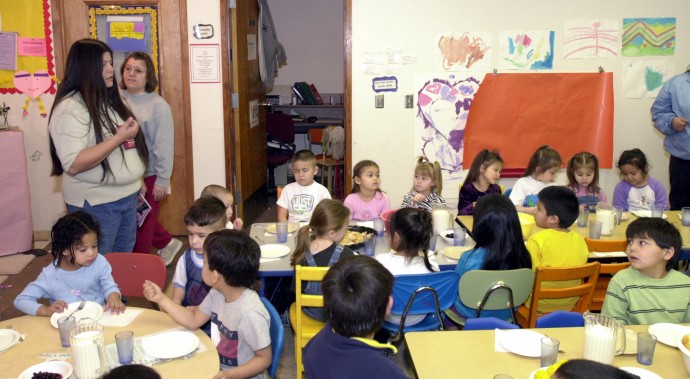
LOS ANGELES — The history of white settlers’ contact with the aboriginal natives of Humboldt County, Calif., in the mid-19th century is as bloody as any of the wars over white colonization of the Great Plains, culminating in the Indian Island Massacre of about 100 members of the Wiyot tribe in February 1860.
More than 150 years later, that history has resurfaced in a lawsuit against officials of the Humboldt County school district and two of its schools alleging they “have subjected and continued to subject black and Native American students to a racially hostile educational environment.”
Native Americans, who constitute about 6 percent of the predominantly rural county’s population of 135,000, are now an economic force in the area, operating five gaming casinos, and have been working to preserve their languages and cultures. But according to the suit, the public educational system has been discriminating against Native American students by, among other things, “ignoring or actively affronting” their cultural history.
One history teacher at Eureka High School, the suit says, had her students make up different Native American tribes and then pretend to fight each other to “teach her students that this was how Native Americans traditionally resolved conflict between their communities. This lesson was both wildly inaccurate and extremely insulting to her Native American students.”
Last spring, moreover, the history teacher of one of the plaintiffs in the case — a 16-year-old Yurok Indian girl identified only as Alexis R. — allegedly questioned her inappropriately about a 19th-century massacre of Wiyot Indians.
Alexis R. was upset that the teacher inaccurately explained the massacre and targeted her to discuss it, the suit says, “both because it is a sensitive topic and because Alexis R. is a member of a different tribe.”
Tribal members “are very sensitive to the fact that their history has been suppressed and that [the white community] is ignorant of a lot of the things that happened to the Indian community,” local historian and former teacher Jerry Rohde told MintPress in an interview.
The suit also alleges the school district has unfairly denied Native American students equal educational opportunities by pushing them out of district schools and into the county’s alternative community school system at disproportionately high rates. Alexis R. allegedly was labeled a “habitual truant” for taking unexcused absences from Eureka High School to attend Yurok cultural activities, including salmon fishing in the Klamath River.
“[A]nnual salmon fishing is extremely important both for Alexis R.’s family’s wellbeing, her cultural identity, and the cultural identity of the Yurok tribe,” the suit says.
American Civil Liberties Union of Northern California attorney Jory Steele, who is representing the plaintiffs, is hoping the lawsuit will be a vehicle for “transformational change” in the Eureka City Schools District. In 2009, a school district in neighboring Del Norte County agreed to address disparities in the disciplining of Native American students to settle a lawsuit filed by the ACLU.
“There seems to be a culture that is hostile to students who are perceived to be ‘other,’” Steele said. “There needs to be a transformation of the culture.”
Reign of terror
White culture came suddenly and violently to the redwood forests, woodlands and prairie of California’s North Coast. The California Gold Rush brought the first white settlers to the area in 1850 and, within weeks of their arrival, whites had murdered their first Indians and destroyed their first Wiyot village. Deprived of their food supply, some Indians resorted to castle rustling, increasing tensions with settlers. On Feb. 25, 1860, a group of ranchers crossed Humboldt Bay near Eureka and attacked Wiyot men, women and children on Indian Island.
According to Rohde, it was one of perhaps 100 massacres and attacks on North Coast Indians during the 1850s and 1860s. The pre-contact population of more than 3,000 Yurok Indians dwindled to 1,350 by 1870 and as few as 668 by 1910. The Yuroks have rebounded — with almost 6,000 members, it is now California’s largest tribe — while the Wiyots have regrouped on a new reservation, built a new community center and have even revived the practice of basketry, for which they were once famous.
But the shadow of the past lives on.
“When you talk to Yuroks, the first thing that comes up is the massacres that occurred,” Steele noted. Many, she added, are descendants of victims of the massacres.
Humboldt County’s population is 84.5 percent white. On the majority’s side, Rohde said, the attitude toward the past is often one of denial.
“There is a tremendous amount of information that has not been processed by the larger population about what happened to Indian tribes in this area in the 19th century,” he said. “There was a reign of terror that lasted for 15 years in Humboldt County. That story has not really been told to any great extent [in the white community].”
The Eureka school district mirrors the broader demographic imbalance, with Native Americans accounting for only 6 percent of the student population. And according to the ACLU’s suit, its teaching of history at Eureka High and Zane Middle School mirrors the broader disregard for the sensitivities of Native Americans.
“The inaccuracy of the curriculum and failure to properly address Native American history is particularly troubling, given the large population of Yurok, Hoopa, and Wiyot tribe members in the Eureka area, and given the history of marginalization and violence in the region,” the suit, which was filed last month, says.
Hostile educational environment
The ACLU began investigating racism and harassment at Eureka City schools about a year ago after a woman whose grandson was being bullied made a complaint to the district’s hotline. During the investigation, Steele said, the civil rights group met with leaders of the Yurok tribe and made presentations to tribal councils. The allegations in the suit are “very extreme,” Steele said, explaining why the investigation took so long.
“They speak to the ongoing discrimination that Native Americans face [in Humboldt County], their uphill battle for survival,” she told MintPress.
Alexis R., the Yurok girl, began attending Zane Middle School in 2009. During that school year, the suit says, she contracted “swine flu,” causing her to fall behind in her classes while she recuperated. Instead of helping her to recover credits by offering tutoring or after-school assistance, officials allegedly told her to transfer to the local community school.
The transfer, the suit says, “represents a pattern in which the district inappropriately pushes Native American school students into county community schools,” which under California law, are intended for “high-risk” students such as those who have been expelled from mainstream schools or referred through the county probation department.
During the 2011-2012 school year, enrollment of Native Americans at Eureka Community School was three times their enrollment in district schools. The community school had a dropout rate of 13 percent in 2010-2011 compared to 4 percent at Eureka High.
“We’re very concerned about why Native American students being are placed in these schools,” Steele said.
After being allowed to enrol at Eureka High, Alexis R. allegedly experienced “an educational environment that is hostile to Native American students in other ways,” including being quizzed about the massacre of Wiyots, unfairly disciplined, and refused absences for cultural activities that are “of critical importance to the preservation and validation of Native American tribes’ and individuals’ cultural identities.”
Having been classified as a habitual truant, the suit alleges, Alexis R. is now in danger of being involuntarily transferred back to the community school. When her mother complained to a district official about the failure to excuse her absences, he allegedly told her that “if she wants to change that policy, she will have to speak to the governor of California.”
Instead, the Yurok girl and her three co-plaintiffs — two black girls and one black boy — are now trying to change policy through their lawsuit, which seeks, among other things, an injunction requiring the district to implement “mandatory and effective” training systems for school staff and students on issues relating to racial discrimination, conduct assemblies about diversity and tolerance and end transfers to community schools for students who do not meet the criteria for referral.
In December, the ACLU also filed a complaint asking the U.S. Department of Education to investigate racial discrimination against Wiyot students at a Humboldt County elementary school. According to the complaint, the principal at Loleta Elementary grabbed a Native American student by the ear and asked, “See how red it’s getting?” and another staff member referred to Native American students as “goats” and “sheep.”
The complaint recommends that officials collaborate with tribal councils to establish multi-cultural programming at the school that “serves the needs of Native American students and teaches non-Native American students about the local history.”
Steele noted that as part of the settlement of the Del Norte County case, officials developed a curriculum that teaches the history of the Yurok tribe. Classes in the Yurok language are also now available in the county’s schools.
If such reforms are implemented in Humboldt County, Steele predicted, “they will go a long way to improving the educational opportunities of students.”


